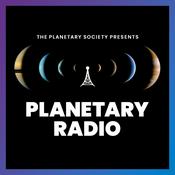Could a single ancient impact have briefly transformed one of the Solar System’s darkest moons into a cryovolcanic world?
When Voyager 2 flew past Uranus in 1986, it captured the only close-up images we have of Umbriel, a heavily cratered, charcoal-dark satellite long considered geologically inactive. But one feature stands out: a bright ring inside the 131-kilometer-wide Wunda crater.
In this episode, Sarah Al-Ahmed speaks with Adeene Denton, NASA postdoctoral program fellow at the Southwest Research Institute, about her team’s new study published in the Journal of Geophysical Research: Planets. Using shock physics simulations, Denton and her colleagues reconstruct the impact that formed Wunda crater to determine what Umbriel’s interior must have been like at the time. Their modeling explores whether impact-induced cryovolcanism can explain the bright deposits observed on the crater floor.
Then, in What’s Up, Bruce Betts, chief scientist of The Planetary Society, joins Sarah to break down one of the key mechanisms that keeps icy moons from freezing solid, tidal heating driven by orbital resonance.
Discover more at: https://www.planetary.org/planetary-radio/2026-cryovolcanism-on-umbriel
See omnystudio.com/listener for privacy information.



